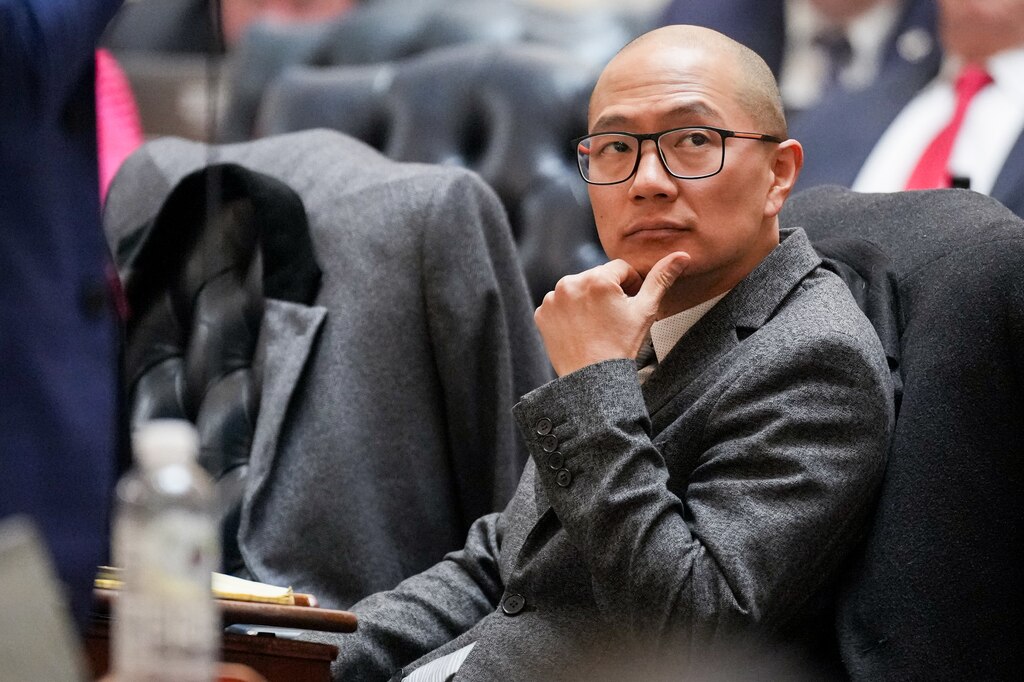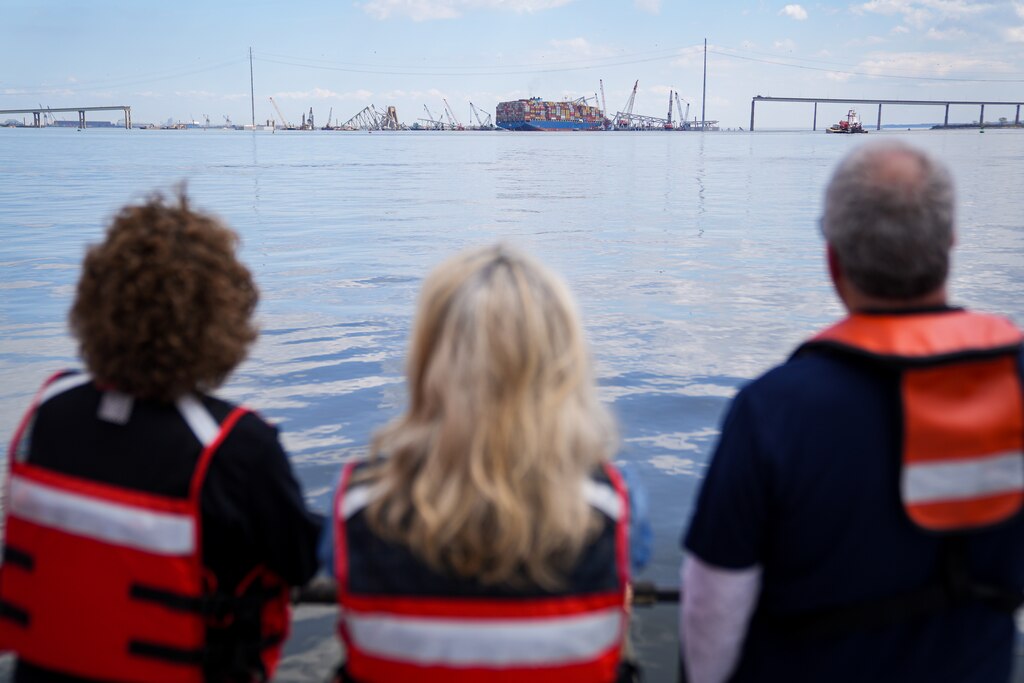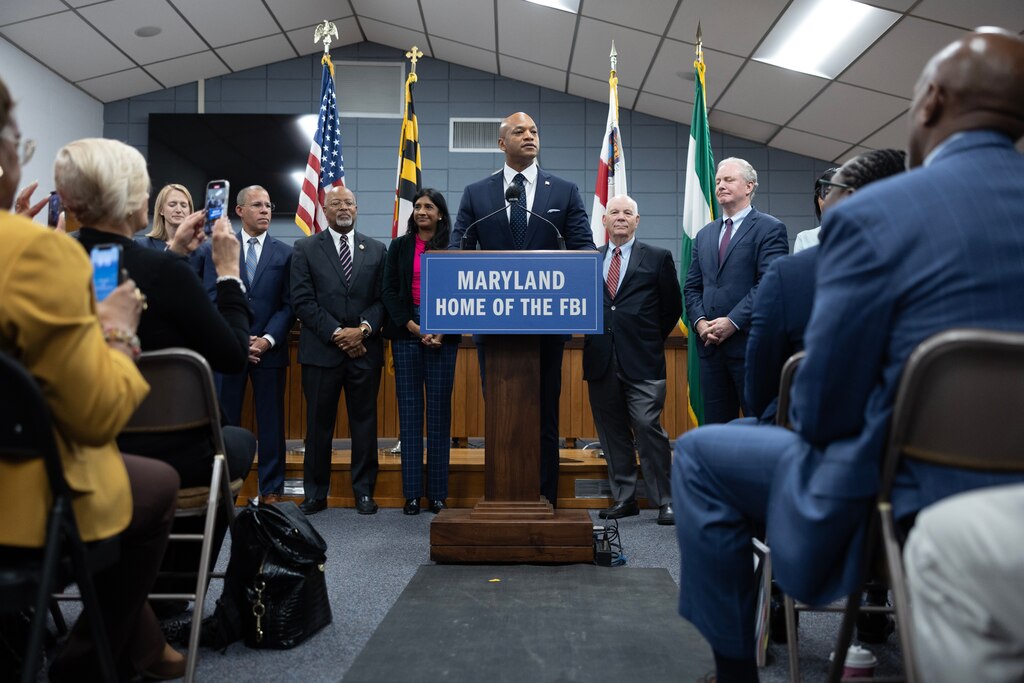Democrat Kamala Harris will undoubtedly win Maryland in the presidential contest this fall.
But the outcome of the election nationally is unknown, and Maryland leaders are preparing for the possibility of another presidency of Republican Donald Trump — one that could come with cuts to federal jobs in the state, questions over funding for key transportation projects, less cooperation on preventing gun violence, and uncertain effects on the state’s budget.
Several of Trump’s policy positions — as well as those prescribed in the Project 2025 plan put out by his allies — would have a unique and detrimental effect on Maryland, officials say.
“I think about it every day,” said Baltimore Mayor Brandon Scott with an edge of dread in his voice.
Asked what concerns him about a Trump presidency, Gov. Wes Moore responded: “I mean, everything.”
Executives like Scott and Moore are gaming out what might happen to federal funding for big projects and how the local economy would be affected by Trump’s policies. Lawmakers, meanwhile, are bracing to take action to counteract Trump decisions that would affect Maryland.
Del. David Moon is the Democratic majority leader in the Maryland House of Delegates and he’s seen this show before. He recalled how, during Trump’s presidency, lawmakers were constantly reacting to Trump decisions — including empowering the attorney general to sue the president and pushing the administration to issue visas for seasonal crab pickers.

At one point, Maryland lawmakers authorized additional state funding for Planned Parenthood, fearful that Trump and Congress would nix grants for family planning services.
“In Maryland, we found ourselves constantly having to safeguard our residents from the various odd and chaotic decisions the Trump administration made,” Moon said.
He added: “I am not looking forward to the prospect of a return to those chaotic years. We spent so much energy not putting all our effort into moving the priorities of Maryland families forward, and instead having to stop all of these unusual culture war policies coming out of the Trump administration.”
Republicans counter that the concerns are overblown, that Trump wouldn’t imperil important projects like rebuilding the Francis Scott Key Bridge or gut federal agencies.
“It’s nothing but fear-mongering on the other side,” said Adam Wood, executive director of the Maryland Republican Party. “They’re not talking about anything he’s talking about. They’re talking about speculation.”
Wood said much of the criticism of Trump is actually criticism of Project 2025, a roadmap for a Republican presidency drawn up by the conservative Heritage Foundation. Instead, people should be focused on the Republican Party’s platform that was approved at their convention this summer — that’s the plan that Trump is advocating, Wood said.
“I’m tired of them talking about Project 2025 because they’re the only ones talking about it,” he said.
Whether it’s from Project 2025 or Trump’s own statements and history, here’s a look at some of the issues that Democratic leaders are concerned about should Trump win the election.
Transportation funding
All states vie for federal funding for transportation projects such as roads, bridges and train lines. Maryland has multiple major transportation projects in the Baltimore region that rely on federal funding that Trump could target.
After the Francis Scott Key Bridge was struck by a ship and collapsed into the Patapsco River in March, President Joe Biden pledged the federal government would fund 100% of the estimated near-$2 billion rebuilding cost.

But Congress has yet to sign off on that plan, and leaders are worried a Trump presidency or Republican-majority Congress would permanently nix it. If that’s the case, Maryland would likely have to pay 10% of the rebuilding cost.
Then there’s the matter of the Red Line, a proposed east-west light rail line across Baltimore that Moore resuscitated after then-Gov. Larry Hogan eliminated it in 2015 and turned back $900 million in federal grants. Would Trump’s transportation department support a mass transit project in a city he’s derided as “disgusting, rat and rodent infested”?
Baltimore also has two key rail projects planned that involve federal funding, expanding the Howard Street Tunnel that carries freight traffic and building a new Frederick Douglass Tunnel for Amtrak and MARC trains.
“We are anticipating, and unfortunately we have to prepare for, essentially an entire upending of basic infrastructure and transportation needs that we have in our state if there is a return of Donald Trump to the White House,” Moore said.
Rachel Reisner, a regional spokesperson for the Trump campaign, said Trump would fund “infrastructure throughout America” because he would “redirect money from the Green New Scam-type spending” — though she did not make any pledges about Maryland’s infrastructure needs.
Federal workers
Maryland, with its proximity to the District of Columbia, has a large share of federal government workers and contractors among the population.
The state is home to both military and civilian agencies, including the National Security Agency, the Social Security Administration and the National Institutes of Health.
About 352,000 Maryland households rely on either a federal government paycheck or pension to pay their bills. That’s about 10.5% of all income earned in Maryland, according to the Moore administration.
A gutting of the federal workforce as proposed in Project 2025 would have a disproportionate impact on Marylanders and the Maryland economy because of the concentration of federal employees and retirees here.
“Trump and Republicans, largely, are hostile to the federal government and they carry through that hostility and direct it at federal employees,” said U.S. Rep. Steny Hoyer, the unofficial leader of Maryland’s delegation on Capitol Hill who has a large concentration of federal workers in his Southern Maryland district.
Trump’s allies want to replace many career civil service workers with political appointees and eliminate union protections, he said.
“Federal employees ought to be worried — very worried — about a candidate for president who holds those kind of views,” Hoyer said.
Trump also relocated federal agencies away from the nation’s capital during his first term. Most notably, two bureaus of the U.S. Department of Agriculture were moved to Kansas City. Roughly 500 employees were affected by the decision and about half chose to quit rather than relocate. Staffing has since recovered, but a government audit found the forced relocation affected the agencies’ ability to conduct economic research and administer grants.
Trump’s team did not respond to a question about the fate of federal workforce under a potential future Trump administration.
FBI headquarters
For more than a decade, Maryland leaders from both parties have fought to get a replacement for the FBI’s aging Hoover Building in D.C. built in the state, finally winning approval for a site in Greenbelt last year.
Maryland faced competition from Virginia in the site selection, but faced even tougher opposition from the Trump administration. When Trump was in office from 2017 through 2021, he put the FBI headquarters project on hold, preferring to keep the agency at the Hoover Building.
The Hoover Building is just a stone’s throw from what was once the Trump International Hotel, which was sold and is now a Waldorf Astoria hotel.
Trump said keeping the FBI in D.C. is a “centerpiece” of his plan to “renovate and rebuild” the capital city.
“The new FBI building should be built in Washington, D.C., not Maryland,” the former president posted on social media in May. His campaign did not respond to a question from The Baltimore Banner about the path forward for the FBI building if he’s elected.

Winning the FBI headquarters was a longtime passion of Hoyer’s, and one he doesn’t want to see reversed. Hoyer said “it’s difficult to know” what Trump will do about the FBI if he’s re-elected.
“I have been saying, only half-jokingly, they better hurry up and break ground on the new FBI headquarters” to preempt a Trump-inspired cancellation, Moon said.
Gun violence prevention
Biden created the first-ever White House Office of Gun Violence Prevention, aimed at coordinating efforts to stem the tide of gun violence. The office has worked with officials both in Baltimore, where reducing shootings is a constant challenge, and state government, which created its own gun violence prevention center in the state health department.
Scott has joined with other mayors in meetings with the Biden administration on the issue.
Losing that relationship and shared commitment is top of mind to Scott when it comes to a potential Trump presidency.
“The first thing I think about is the historic progress that we’ve made in reducing gun violence in the city and how deeply that’s been a partnership between my office and the White House directly,” Scott said.
Approaches like the Group Violence Reduction Strategy and viewing gun violence through a public health lens are not at all in line with Trump’s view of guns, Scott said.
“We know that the former president doesn’t believe in these things, doesn’t understand it and he will do whatever the gun companies tell him. He will not understand that this is solely about policing,” the mayor said. “That’s the thing I think about the most.”
Karoline Leavitt, Trump’s national press secretary, said in a statement that Trump will “stop the surge of violent crime plaguing our communities, restore the rule of law, and make America safe again.”
Maryland’s state budget
It’s unclear exactly how a Trump presidency would affect the state budget, which already faces a shortfall in future years as revenue doesn’t keep pace with planned programs.
Trump sponsored tax cuts in 2017 that are set to expire in the coming years, but he may be able to extend them. That affects how much money flows to the state.
And overall, Trump may be less interested in helping blue states like Maryland pay for their projects. Less money from federal sources going to state projects means more state money will be needed, putting a further strain on a tight budget where lawmakers debated tax and fee increases versus spending cuts last session.
Not that Trump met his infrastructure funding promises before, Hoyer noted.
“Trump delivered zero on his commitment of $1 trillion in infrastructure investment,” Hoyer said.
Trump has a history, Moon noted, of “using the levers of political spending as tools for punishment for states that he thought did not support him.”



Comments
Welcome to The Banner's subscriber-only commenting community. Please review our community guidelines.